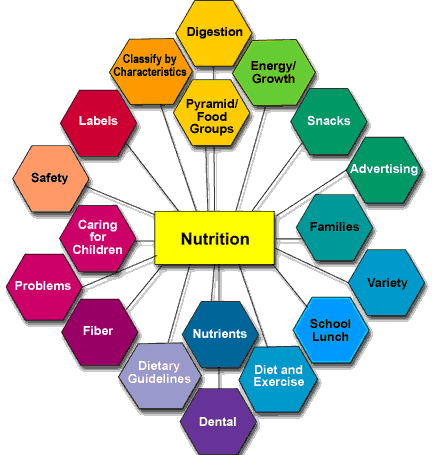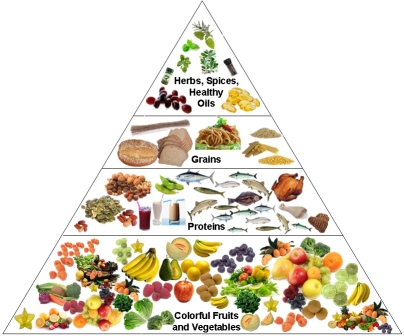Nutrition: Difference between revisions
No edit summary |
No edit summary |
||
| Line 12: | Line 12: | ||
The principles of physiotherapy is based on movement sciences and | The principles of physiotherapy is based on movement sciences and aims o restore fhe ufnction of multiple body systems<ref>Khalid MT, Sarwar MF, Sarwar MH, Sarwar M. [http://files.aiscience.org/journal/article/pdf/70290003.pdf Current role of Physiotherapy in response to changing healthcare needs of the society]. International journal of education and information technology. 2015. Vol 1 No 3, pages 105-110.</ref>. Physical therapists/ Physiotherapists are committed to improve and promote wellness<ref>Burniston J, Eftekhari F, Hrabi S, Worsley R, Dean E. [https://www.sciencedirect.com/science/article/pii/S1013702512000267 Health behaviour change and lifestyle-related condition prevalence: Comparison of two epochs based on systematic review of the physical therapy literature]. Hong Kong Physiotherapy journal. 2012. Vol 30. Pg 44-56.</ref>, general health, lifestyle and quality of life. In some cases i t is also their role to reverse and manage lifestyle erlated conditions with non-pharmacological interventions. They are well -ositioned as established healthcare practitioners, to provide clinically relevant patient education with long-term health benefits as well as lifestyle [[Behaviour Change|behaviour changes]] to improve their general health and physical therapy outcomes.<ref>Alexander J, Bambury E, Mendoza A, Reynolds J, Veronneau R, Dean E. [https://www.sciencedirect.com/science/article/pii/S1013702512000280 Health education strategies used by physical therapists to promote behavioural change in people with lifestyle-related conditions]: A systematic review. Hong Kong Physiotherapy journal. 2012. Vol 30. Pg 57-75.</ref> | ||
Unhealthy lifestyle | Unhealthy lifestyle behaviors are primary contributors to the prevalence of lifestyle-related conditions, To manage a patient as a whole with n holistic approach makes it essential for physiotherapists to have the basic knowledge about the role of nutrition in these lifestyle conditions, as well as understand the effects of a successful behaviour change. | ||
'''Lifestyle | '''Lifestyle behaviors include:''' | ||
* | * Tobacco use/ [[Smoking Cessation and Brief Intervention|smoking]] | ||
* | * Sedentary lifestyles ([[Physical Inactivity|inactivity]]) | ||
* | * Poor nutritional intake | ||
* | * Elevated [[Stress and Health|stress]] | ||
* [[Sleep Deprivation and Sleep Disorders| | * [[Sleep Deprivation and Sleep Disorders|Sub-optimal sleep]] | ||
* [[obesity]] | * [[obesity]] | ||
'''Preventable [[Non-Communicable Diseases|lifestyle conditions]] include:''' | '''Preventable [[Non-Communicable Diseases|lifestyle conditions]] include:''' | ||
* [[Heart Failure| | * [[Heart Failure|Ischemic heart disease]] | ||
* [[Blood Pressure| | * [[Blood Pressure|Hypertension]] | ||
* [[stroke]] | * [[stroke]] | ||
* [[Diabetes Mellitus Type 2| | * [[Diabetes Mellitus Type 2|Type-2 Diabetes Mellitus]] | ||
* | * Cancer (some cases) | ||
* [[emphysema]] | * [[emphysema]] | ||
| Line 40: | Line 40: | ||
* [[Vitamin D Deficiency]] | * [[Vitamin D Deficiency]] | ||
* [[Determinants of Health]] | * [[Determinants of Health]] | ||
* [[Behaviour Change]] | * [[Behaviour Change|Behavior Change]] | ||
* [http://www.fatsickandnearlydead.com/ Fat, Sick and Nearly Dead] (Free on Netflix) [http://www.amazon.com/Fat-Sick-Nearly-Dead/product-reviews/B004V4ASB2/ref=sr_1_1_cm_cr_acr_txt?ie=UTF8&showViewpoints=1 Amazon reviews] | * [http://www.fatsickandnearlydead.com/ Fat, Sick and Nearly Dead] (Free on Netflix) [http://www.amazon.com/Fat-Sick-Nearly-Dead/product-reviews/B004V4ASB2/ref=sr_1_1_cm_cr_acr_txt?ie=UTF8&showViewpoints=1 Amazon reviews] | ||
* [https://www.foodmatters.com/film/food-matters Food Matters] (Free on Netflix) [http://www.amazon.com/Foodmatters-Andrew-W-Saul/product-reviews/B001B3XZAW/ref=sr_1_1_cm_cr_acr_txt?ie=UTF8&showViewpoints=1 Amazon reviews] | * [https://www.foodmatters.com/film/food-matters Food Matters] (Free on Netflix) [http://www.amazon.com/Foodmatters-Andrew-W-Saul/product-reviews/B001B3XZAW/ref=sr_1_1_cm_cr_acr_txt?ie=UTF8&showViewpoints=1 Amazon reviews] | ||
Revision as of 23:09, 25 September 2020
Definition[edit | edit source]
According to the World Health Organization, "Nutrition is the intake of food, considered in relation to the body’s dietary needs. Good nutrition – an adequate, well-balanced diet combined with regular physical activity – is a cornerstone of good health. Poor nutrition can lead to reduced immunity, increased susceptibility to disease, impaired physical and mental development and reduced productivity."[1]
Physiotherapist's role in nutrition[edit | edit source]
According to APTA, "It is within the professional scope of physical therapist practice to screen for and provide information on diet and nutritional issues to patients, clients, and the community."[2]
The principles of physiotherapy is based on movement sciences and aims o restore fhe ufnction of multiple body systems[3]. Physical therapists/ Physiotherapists are committed to improve and promote wellness[4], general health, lifestyle and quality of life. In some cases i t is also their role to reverse and manage lifestyle erlated conditions with non-pharmacological interventions. They are well -ositioned as established healthcare practitioners, to provide clinically relevant patient education with long-term health benefits as well as lifestyle behaviour changes to improve their general health and physical therapy outcomes.[5]
Unhealthy lifestyle behaviors are primary contributors to the prevalence of lifestyle-related conditions, To manage a patient as a whole with n holistic approach makes it essential for physiotherapists to have the basic knowledge about the role of nutrition in these lifestyle conditions, as well as understand the effects of a successful behaviour change.
Lifestyle behaviors include:
- Tobacco use/ smoking
- Sedentary lifestyles (inactivity)
- Poor nutritional intake
- Elevated stress
- Sub-optimal sleep
- obesity
Preventable lifestyle conditions include:
- Ischemic heart disease
- Hypertension
- stroke
- Type-2 Diabetes Mellitus
- Cancer (some cases)
- emphysema
Physiotherapist's Role in Providing Specific Nutritional or Dietary Advice[edit | edit source]
Physical therapists/ Physiotherapists without the necessary nutrition-related education are not allowed to give dietary advice, but play a vital role in the screening and referring of patients that are in need of dietary advice or who can benefit from it. Many conditions managed and seen by physiotherapists are directly affected by diet and nutrition.
Related Pages and Documentaries[edit | edit source]
- Sports Nutrition
- Vitamin B12 Deficiency
- Vitamin D Deficiency
- Determinants of Health
- Behavior Change
- Fat, Sick and Nearly Dead (Free on Netflix) Amazon reviews
- Food Matters (Free on Netflix) Amazon reviews
- Food Inc (Free on Netflix) Amazon reviews
- Forks over Knives (Free on Netflix) Amazon reviews
References[edit | edit source]
- ↑ World Health Organization. Accessed: 3 March 2019. Available at: https://www.who.int/topics/nutrition/en/ .
- ↑ APTA. Role Of PT Diet Nutrition. Available from: https://www.apta.org/apta-and-you/leadership-and-governance/policies/role-of-pt-diet-nutrition. [Last accessed: 26 September 2020]
- ↑ Khalid MT, Sarwar MF, Sarwar MH, Sarwar M. Current role of Physiotherapy in response to changing healthcare needs of the society. International journal of education and information technology. 2015. Vol 1 No 3, pages 105-110.
- ↑ Burniston J, Eftekhari F, Hrabi S, Worsley R, Dean E. Health behaviour change and lifestyle-related condition prevalence: Comparison of two epochs based on systematic review of the physical therapy literature. Hong Kong Physiotherapy journal. 2012. Vol 30. Pg 44-56.
- ↑ Alexander J, Bambury E, Mendoza A, Reynolds J, Veronneau R, Dean E. Health education strategies used by physical therapists to promote behavioural change in people with lifestyle-related conditions: A systematic review. Hong Kong Physiotherapy journal. 2012. Vol 30. Pg 57-75.








